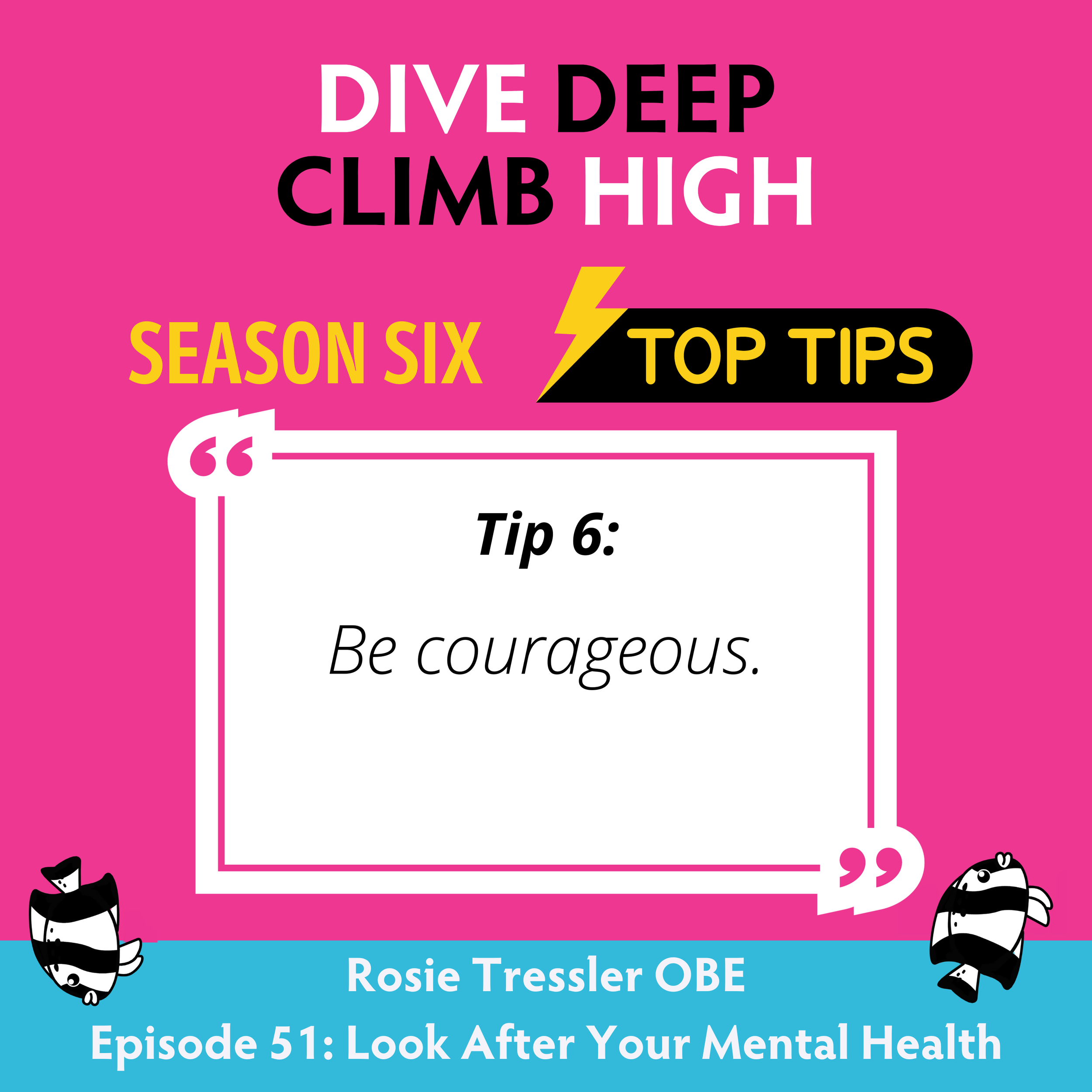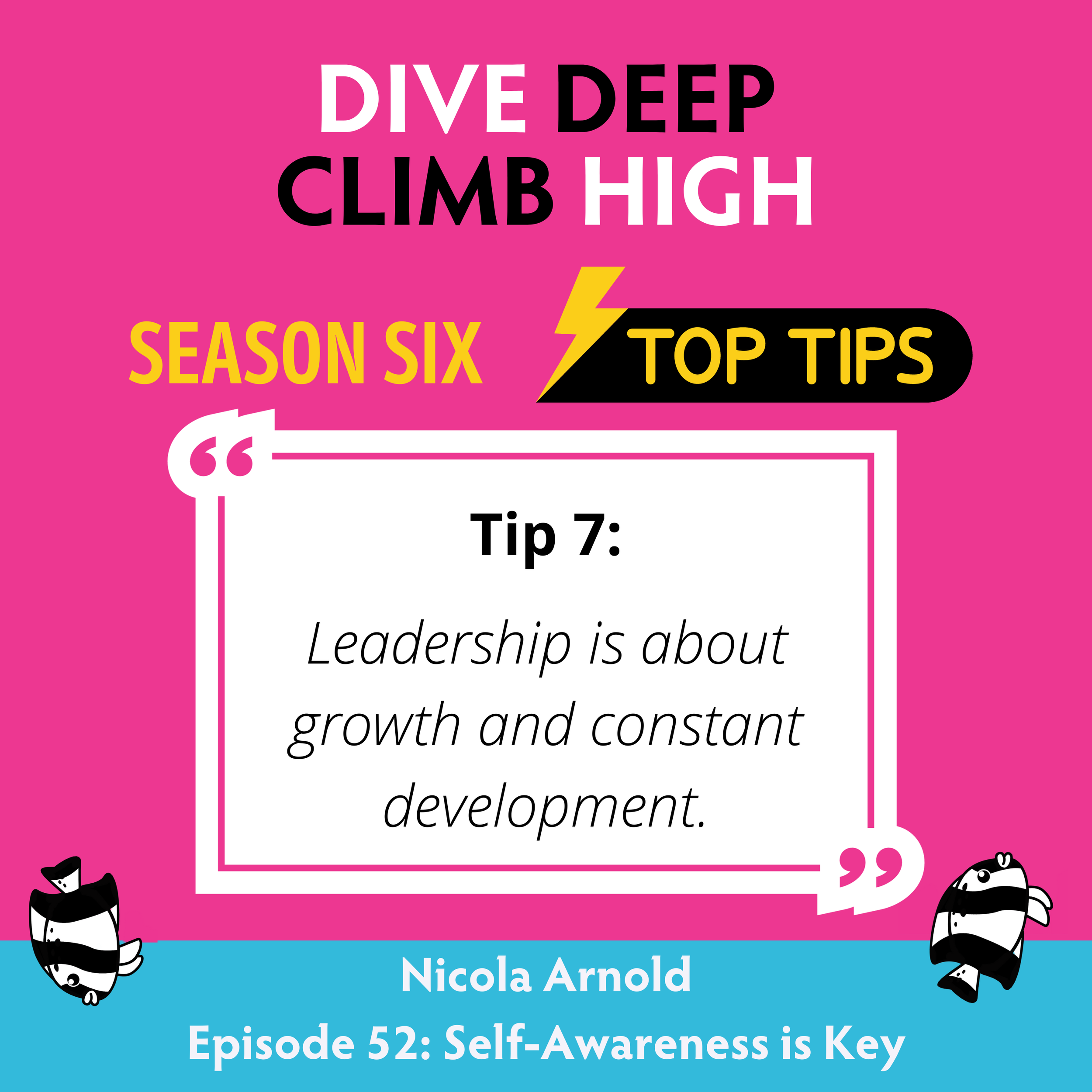Podcast Season Six Top Tips
I continue to be amazed by the fantastic insights that are shared with me during each of the conversations I have on my Dive Deep, Climb High leadership podcast. Therefore, I am pleased to share with you, the Ten Top Tips that stood out for me across the latest season. So if you haven’t had the opportunity to listen to all of the episodes from Season 6, you will still be able to access some of the learning.
Here are my ten top tips from Season Six:
Be inclusive and relevant
During our conversation, I asked Rosie, CEO of the charity Student Minds what are the most important aspects of leadership for her. Rosie believes that as leaders we need to be inclusive, and we need to listen. Then we will be relevant. Rosie spends a great deal of time with students listening to what they most care about. This is her way of ensuring she stays relevant and not kicking issues down the road that actually need to be considered in the here and now.
As a leader how do you ensure you stay relevant?
What’s it like to be on the receiving end of you?
Oh, my goodness, what an awesome question. This is a question that Nicola and her team ask a lot on their leadership academy programmes. What is it like to be on the receiving end of you? Do you think you know the answer? Have you ever asked your team, your colleagues, your manager?
It takes a brave person to ask a question when they know they may not get the answers they want. How brave are you?
Awareness is the underlying driver of change
In this fascinating episode, we explored Reiner’s scientific approach to mindfulness and the development of a high-performance mindset. For Reiner there are three elements – the mind, the body and most important of all, awareness. Without awareness you can’t make sustainable change. With awareness comes choice. How self-aware are you?
Most of us would like to think we are very self-aware but in my experience that isn’t always the case. When something goes wrong, do you look outside of yourself to find the answer, or do you turn your focus inwards? Being truly self-aware can be challenging because undoubtedly there will be times when you hold up a mirror to yourself and don’t like what you see. The light at the end of that tunnel of darkness is that we always have an opportunity to change and ultimately develop a high-performance mindset.
If you’re not listening, you’re not leading
During our deep dive conversation into the major challenges facing the US Higher Education sector, Lori spoke of the importance of listening. Listening is such an underrated leadership skill. Ask most leaders, in fact most people, and they will say they have great listening skills. But do they? Do you? Many times, we can find ourselves in situations where we are listening to respond rather than understand. And that isn’t helpful.
So, here’s a challenge…the next time you are in a meeting where you are attached to the outcome (perhaps you need to get buy-in from the people round the table or you want to ensure a member of your team takes on the feedback you have for them), pay attention to how you are listening.
Do you listen with an open mind, or do you lose interest part way through as you have already decided how you will reply to what they are saying? As I always said to my daughters when they were growing up, you have two ears, and one mouth for a reason!
When you are made redundant it is important to emotionally let go of your previous employer before moving onto something else.
Being made redundant is one of the most traumatic experiences we can have during our working life, and I say this having been made redundant in my early twenties. As a career coach John often helps people who have been through redundancy and are thinking, “What next?” One piece of advice John gave was that if you are made redundant, take time out to ensure you emotionally let go of your previous employer.
His words really resonated with me because so often in life when we experience a traumatic event (redundancy, divorce, the death of a loved one, the list is endless) we often feel that we have to adopt that very British approach of a stiff upper lip. We refuse to confront how we are really feeling and instead try to move on as quickly as possible so that we can prove to ourselves and everyone around us that we are fine. In reality we are probably feeling anything but okay. If you ever find yourself in this position, I would urge you to follow John’s advice and take some time out to process everything that you’re feeling before making any decisions about what is next for you.
Be courageous
Be courageous. Two very powerful words. What does being courageous as a leader mean to you?
We are all different and therefore our definition of courageous will be different. Early on in my career, I struggled to deliver constructive feedback. I was fine giving positive feedback, that was a joy. However, when it came to giving feedback that I perceived as ‘negative’, boy did I struggle.
Now of course I have a very different perspective and whilst I can still find it challenging, I do realise that if I avoid it, if I bury my head in the sand, then I am doing both myself and the recipient a huge injustice. Reframing ‘feedback’ to ‘feedforward has really helped. I also realise that my avoidance was depriving the other person of the opportunity to grow and develop and that is something I would never want to do. It flies in the face of my values. For me, being courageous means pulling on my big girl pants and doing things that take me outside my comfort zone.How could you be more courageous as a leader?
Leadership is about growth and constant development
Yes, yes, yes! If you ever think you have it nailed as a leader, then you are dead in the water. A harsh statement? Maybe but it is what I honestly believe.
Nicola is absolutely right. Great leaders never stop learning. They have a desire to keep growing and developing because they understand you can never be too good a leader. And whilst growth can come from attending courses, reading the latest books, it doesn’t have to.
Growth can come from the people around you. One of the things I love most about working in Higher Education, is that I get to work with the leaders of tomorrow, the students. I want to learn as much from them as they hopefully want to learn from me. Keep an open mind, be curious and growth will come.
Become connected with the present moment, be fully present
Become connected with the present moment, be fully present.
There is so much discussion around the benefits of being fully present. As a leader we need to be able to look back and review where we have come from just as we need to consider the future and plan the direction of travel. These have always been staple requirements of a leader’s toolkit, but not so for being connected with the present moment.
For Reiner being fully present is a key element of becoming a mindful leader. For me, I have learnt that by being fully present I can be there in the best possible way for my clients. It also gives me greater focus and clarity. The road to being fully present is not an easy one, it takes persistence. Sometimes I can be fully present but on occasions I can be completely distracted. For me that’s just part of being human. How often do you find yourself connected with the present moment?
Not sure how to connect, then try Reiner’s technique and for just one minute pay attention to your breathing. Let everything else go and for sixty seconds notice your breath. Your inhale and your exhale.
Be a role model
Lori spoke of the importance of leaders being a role model. If asked many leaders would say they were a good role model and yet, I have witnessed numerous occasions when managers and leaders have demonstrated the opposite behaviours to those they want to see in their teams.
As a leader, people will be looking to you for direction. Over the years I have worked with great leaders who I would love to emulate as well as those where I think “I am never going to choose to behave like that.”
Most leaders can be a mix of great and not so great. The challenge is to look in that mirror and be honest with yourself. When do you role model great leadership behaviours and when do you behave a little less graciously? Are you asking your team to behave in a way that is different to you? On a scale of one to ten, how would you rate yourself as role model for your team and the people you work with?
Do the right thing, be ethical
What a wonderful final tip to end with. Do the right thing, be ethical.
As leaders we will all have different ideas about what doing the right thing means for us. Of course, there will be some situations where there is a clear right or wrong action but so often as a leader, we have to manage the grey, where there isn’t that clarity. On these occasions, we have to turn our focus inwards and consider the best course of action. In my experience if you make a decision that aligns with your personal values you can’t go too wrong.
Leadership is tough and doing the right thing isn’t always easy. What strategies do you have in place to help you decide what to do?
Five wonderful guests with great wisdom to share. A massive thank you to Rosie, Nicola, Reiner, Lori and John for taking the time to chat with me and so generously share your knowledge and experience. I have chosen just ten tips but there are lots more contained within every podcast episode. Click on the link below to listen to all previous podcast episodes.
Dive deep. Climb high. Can-do leadership in a world of can’t.










